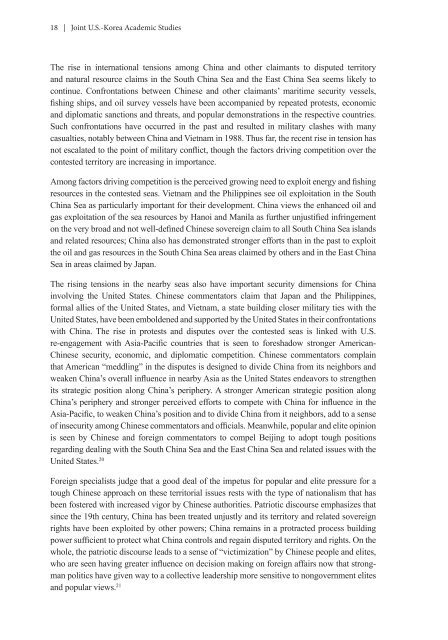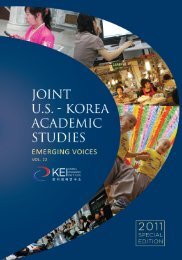the full publication PDF - Korea Economic Institute
the full publication PDF - Korea Economic Institute
the full publication PDF - Korea Economic Institute
Create successful ePaper yourself
Turn your PDF publications into a flip-book with our unique Google optimized e-Paper software.
18 | Joint U.S.-<strong>Korea</strong> Academic Studies<br />
The rise in international tensions among China and o<strong>the</strong>r claimants to disputed territory<br />
and natural resource claims in <strong>the</strong> South China Sea and <strong>the</strong> East China Sea seems likely to<br />
continue. Confrontations between Chinese and o<strong>the</strong>r claimants’ maritime security vessels,<br />
fishing ships, and oil survey vessels have been accompanied by repeated protests, economic<br />
and diplomatic sanctions and threats, and popular demonstrations in <strong>the</strong> respective countries.<br />
Such confrontations have occurred in <strong>the</strong> past and resulted in military clashes with many<br />
casualties, notably between China and Vietnam in 1988. Thus far, <strong>the</strong> recent rise in tension has<br />
not escalated to <strong>the</strong> point of military conflict, though <strong>the</strong> factors driving competition over <strong>the</strong><br />
contested territory are increasing in importance.<br />
Among factors driving competition is <strong>the</strong> perceived growing need to exploit energy and fishing<br />
resources in <strong>the</strong> contested seas. Vietnam and <strong>the</strong> Philippines see oil exploitation in <strong>the</strong> South<br />
China Sea as particularly important for <strong>the</strong>ir development. China views <strong>the</strong> enhanced oil and<br />
gas exploitation of <strong>the</strong> sea resources by Hanoi and Manila as fur<strong>the</strong>r unjustified infringement<br />
on <strong>the</strong> very broad and not well-defined Chinese sovereign claim to all South China Sea islands<br />
and related resources; China also has demonstrated stronger efforts than in <strong>the</strong> past to exploit<br />
<strong>the</strong> oil and gas resources in <strong>the</strong> South China Sea areas claimed by o<strong>the</strong>rs and in <strong>the</strong> East China<br />
Sea in areas claimed by Japan.<br />
The rising tensions in <strong>the</strong> nearby seas also have important security dimensions for China<br />
involving <strong>the</strong> United States. Chinese commentators claim that Japan and <strong>the</strong> Philippines,<br />
formal allies of <strong>the</strong> United States, and Vietnam, a state building closer military ties with <strong>the</strong><br />
United States, have been emboldened and supported by <strong>the</strong> United States in <strong>the</strong>ir confrontations<br />
with China. The rise in protests and disputes over <strong>the</strong> contested seas is linked with U.S.<br />
re-engagement with Asia-Pacific countries that is seen to foreshadow stronger American-<br />
Chinese security, economic, and diplomatic competition. Chinese commentators complain<br />
that American “meddling” in <strong>the</strong> disputes is designed to divide China from its neighbors and<br />
weaken China’s overall influence in nearby Asia as <strong>the</strong> United States endeavors to streng<strong>the</strong>n<br />
its strategic position along China’s periphery. A stronger American strategic position along<br />
China’s periphery and stronger perceived efforts to compete with China for influence in <strong>the</strong><br />
Asia-Pacific, to weaken China’s position and to divide China from it neighbors, add to a sense<br />
of insecurity among Chinese commentators and officials. Meanwhile, popular and elite opinion<br />
is seen by Chinese and foreign commentators to compel Beijing to adopt tough positions<br />
regarding dealing with <strong>the</strong> South China Sea and <strong>the</strong> East China Sea and related issues with <strong>the</strong><br />
United States. 20<br />
Foreign specialists judge that a good deal of <strong>the</strong> impetus for popular and elite pressure for a<br />
tough Chinese approach on <strong>the</strong>se territorial issues rests with <strong>the</strong> type of nationalism that has<br />
been fostered with increased vigor by Chinese authorities. Patriotic discourse emphasizes that<br />
since <strong>the</strong> 19th century, China has been treated unjustly and its territory and related sovereign<br />
rights have been exploited by o<strong>the</strong>r powers; China remains in a protracted process building<br />
power sufficient to protect what China controls and regain disputed territory and rights. On <strong>the</strong><br />
whole, <strong>the</strong> patriotic discourse leads to a sense of “victimization” by Chinese people and elites,<br />
who are seen having greater influence on decision making on foreign affairs now that strongman<br />
politics have given way to a collective leadership more sensitive to nongovernment elites<br />
and popular views. 21










